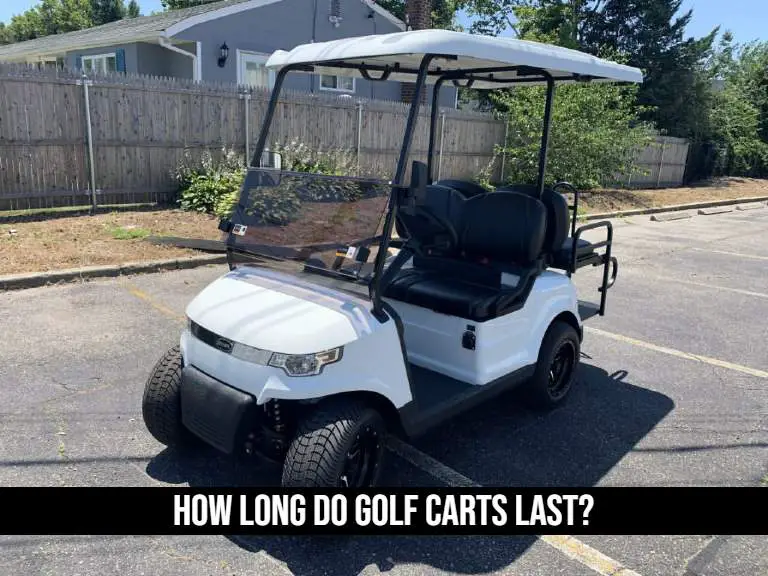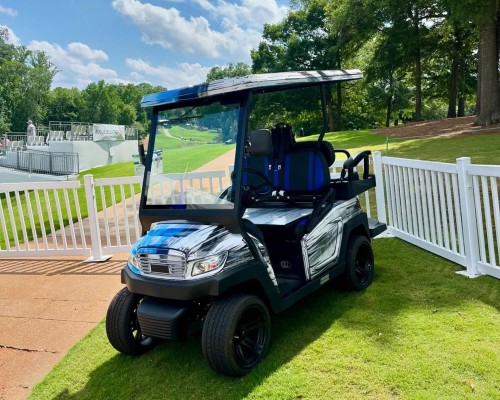
With golf carts being such an essential part of your game, knowing how long they last is crucial.
Various factors affect their lifespan, from maintenance to usage patterns. Here’s a comprehensive guide to help you keep your golf cart running smoothly for years to come.
Factors Influencing the Lifespan of a Golf Cart
1. Maintenance Practices
Regular maintenance is key to extending a golf cart’s life. Neglecting upkeep leads to quicker wear and tear.
Simple actions, like checking the battery water level monthly, can prevent major issues. Proper storage, especially in harsh weather, protects the cart from rust and damage.
Follow the manufacturer’s maintenance schedule strictly to ensure longevity. To better understand the importance of maintenance, check out our guide on How to Increase Golf Cart Battery Life?.
2. Quality of Components
The quality of components directly affects the cart’s lifespan. High-quality batteries and motors last longer. For example, lithium-ion batteries can last up to 10 years with proper care.
Using OEM (original equipment manufacturer) parts ensures compatibility and durability.
Investing in good-quality tires and brakes also prevents frequent replacements and enhances safety.
When purchasing a cart, knowing what to look for when buying a used golf cart can ensure you select a vehicle with high-quality components.
3. Frequency and Intensity of Use
How often and intensely a cart is used significantly impacts its lifespan. Fleet carts, used daily, wear out faster than private carts used occasionally.
Heavy usage in rough terrains or carrying heavy loads shortens the cart’s life.
Regularly inspect and service components like the suspension and brakes if the cart is frequently used in tough conditions.
Proper use and avoiding overloading can help maintain the cart’s efficiency longer.
Average Lifespan of Electric vs. Gas Golf Carts
1. Lifespan of Electric Golf Carts

Electric golf carts typically last 15-20 years with proper care. The battery is the main component affecting lifespan.
Lead-acid batteries last 4-6 years, while lithium-ion batteries can last up to 10 years. Regular maintenance, such as proper charging and keeping batteries clean, is crucial for longevity.
2. Lifespan of Gas Golf Carts
Gas golf carts have an average lifespan of 10-12 years. Proper maintenance, including regular oil changes and engine checks, can extend this period.
Gas engines generally require more frequent maintenance than electric motors, but they can perform well for many years if maintained properly.
How Usage Affects Golf Cart Longevity
1. Impact of Daily Use vs. Occasional Use
Daily use significantly impacts a golf cart’s lifespan. Fleet carts, used daily, typically last 4-6 years before major components need replacement.
In contrast, private carts, used occasionally, can last 10-15 years. Daily use increases wear on batteries, motors, and other parts, necessitating more frequent maintenance.
2. Effect of Terrain on Golf Cart Wear and Tear
Terrain plays a crucial role in the wear and tear of golf carts. Rough terrains, like hilly or uneven courses, strain the cart’s suspension and tires.
Smooth, flat terrains result in less wear and a longer lifespan. Driving on rough surfaces accelerates the need for repairs and replacements of critical components.
3. Influence of Load and Passenger Weight
Load and passenger weight directly affect the longevity of a golf cart. Overloading the cart causes excessive strain on the motor, batteries, and suspension.
Carts designed for two passengers shouldn’t regularly carry four. Exceeding weight limits frequently leads to faster wear and potential damage to the cart’s structure and performance
Essential Maintenance Tips for Prolonging Golf Cart Life

1. Regular Battery Maintenance for Electric Carts
Battery care is crucial for electric golf carts. Check the water level monthly and use distilled water only. Avoid overcharging; use an automatic charger to prevent damage.
Keep battery terminals clean and free from corrosion by scrubbing them with a mixture of baking soda and water. Proper charging and storage can extend battery life up to 10 years.
2. Engine and Oil Maintenance for Gas Carts
Gas carts require regular engine maintenance. Change the oil every 125 hours of use or twice a year, whichever comes first.
Regularly check and replace the air and fuel filters to ensure efficient operation. Inspect the spark plugs and replace them annually for optimal performance.
Using high-quality oil and fuel prevents engine wear and extends its lifespan.
3. Routine Inspections and Service
Perform routine inspections to catch issues early. Check tire pressure monthly and ensure even wear to avoid alignment problems.
Inspect brakes every six months for wear and adjust as needed. Regularly lubricate moving parts like the suspension and steering components.
Schedule professional service checks annually to maintain overall performance and safety.
Final Thoughts!
Understanding the factors influencing the lifespan of golf carts can significantly enhance their longevity.
One unique aspect is the role of climate conditions—extreme temperatures can severely impact battery and engine life.
In essence, electric carts last 15-20 years, while gas carts last 10-12 years with proper care. Regular maintenance, mindful usage, and quality components are key. If you notice frequent breakdowns or costly battery replacements, it might be time for a new cart.

Bob is a golf equipment expert with a wealth of knowledge about the latest and greatest golfing gear. Bob is our Lead Product Reviewer and provides in-depth reviews and recommendations on the best equipment for golfers of all levels. He takes a hands-on approach to testing, using his extensive experience on the course to provide the most accurate and reliable product recommendations. Join Our Team!
